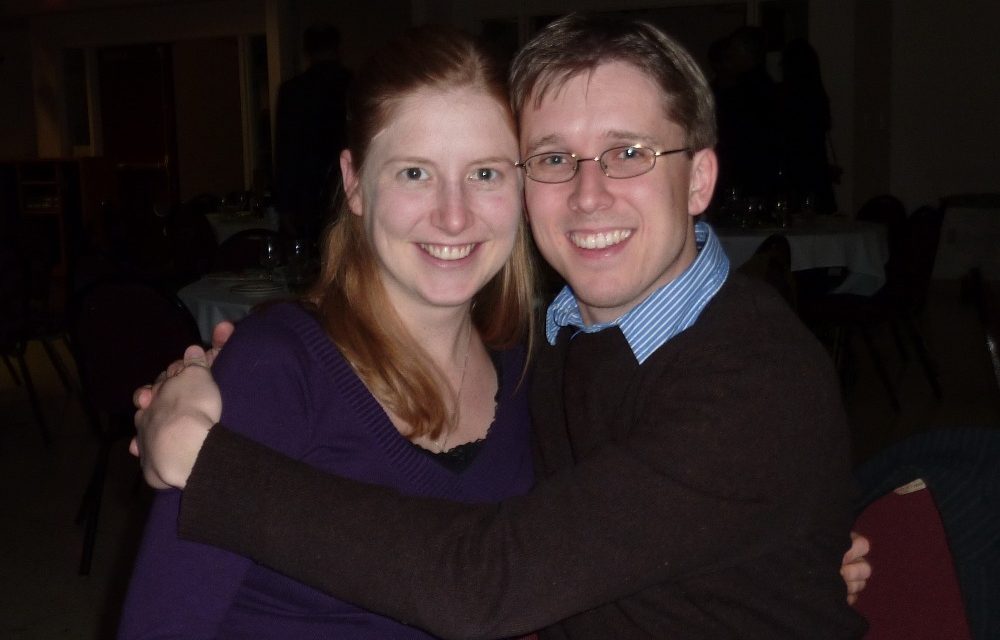The following is a guest post about our friend and charter blogger, Beth Haile, written by Dr. Brian Matz, currently the Sisters of St. Joseph of Carondelet Chair in Catholic Thought at Fontbonne University. Brian was Beth Haile’s colleague when they both taught at Carroll College in Helena, Montana.
If you are interested in helping support the medical expenses of the Haile family, please consider donating at the GoFundMe page set up on their behalf.
The world of Catholic moral theology is losing a good friend. Dr. Beth Haile, a founding member and longtime contributor to this blog, has been diagnosed with a terminal illness, at far too young an age, just after giving birth to her fourth child. She is currently seeking treatment to give her as much as aid as possible, and we will be tireless in our prayers to God on her behalf for a miraculous intervention, but she has rightfully decided to stop most of her academic-oriented activities in order to give her time and attention to family.
While we watch…and pray…we offer this brief reflection on her contributions thus far. No doubt, there are many starting points to any one person’s contributions. One of those points for Beth was, as a teenager, her being invited to read Cardinal Newman’s The Idea of a University. She was captivated by the idea that virtue was the most important thing to be formed within a student. Her own undergraduate years were subsequently shaped by wide-ranging experiences with literature, travel to other continents, spiritual formation…and fine wine. Her doctoral studies at Boston College further cultivated within her a love for virtue as she spent countless hours poring over the writings of Thomas Aquinas. The words prudence and habitus would now roll off her tongue so frequently one could be mistaken for assuming they belonged even in conversations about the weather. Every decision for her was an opportunity for the formation of prudence.
Thankfully, she made the prudent decision during those years to marry Scott Haile, someone equally interested in the life of the mind and the pursuit of virtue. Together, Beth and Scott are a beautiful witness to the idea of a domestic church. They infuse grace into the communities in which they have lived by lovingly embracing each community’s people and each community’s idiosyncrasies while challenging the consumerism and vanity so prevalent within them. This was not an easy accomplishment after moving, in 2011, from Boston to Helena, Montana, for Beth to take up full-time employment in academia at Carroll College. Montana is quite another place from what Beth and Scott had known to that point, but they embraced its quixotic culture and rural, mountain setting. Some of the best nature photography I have seen were taken on their cameras during trips into the wilds of Montana’s rocky mountain front. She was a hit with students. They loved the rigor with which she demanded they account for the place of faith with reason. And she built important connections with other faculty, including, ironically enough, one who had recently lost his spouse, and together they taught a course on the “art of dying”.
Still, in 2014, she made the prudential decision to step away from academic employment in order to raise her quickly-growing and quickly-expanding family. Thankfully, we have continued to benefit from her expertise and cultural engagement here on this blog and in print as she brought fresh perspectives to the questions that animate us.
Yet, life has brought her now to another point of transition. Perhaps, in the coming months, she will find an opportunity to write something more for us. If she does, we know already it will be from a scholar who senses the enduring value of moral theology in shaping our understanding of even the most difficult stages of life.
In the meantime, join us in prayers for God’s intervention and for his comfort and peace for the Haile family.
As a reminder of Beth’s constant dedication to quality posts from the very beginning of this blog in 2011, we invite readers to look in particular at:
- Challenging a Culture of Thinness and Ethics and Eating Disorders, which highlight Beth’s ongoing theological work understanding eating disorders. Beth has also contribuited a chapter on gluttony to a forthcoming collection of essays on The Seven Deadly Sins and the Sacrament of Reconciliation.
- Corpus Christi: Finding Unity in Division and Where Do We Go From Here, which display Beth’s typical and heartfelt commitment to the unity of the Body of Christ, even amidst disagreement and strife.
- The (Moral) Trouble of Living a Middle-Class Life and Sacrificing It All for the Kingdom of Heaven, which offer Beth’s careful and lovingly self-critical ongoing scrutiny of the challenges of everyday life in relationship to the ideals of discipleship.
- Hillbilly Elegy by J.D. Vance, which offers Beth’s nuanced review of this much-discussed book.
- Why I Am Leaving my Other Full-Time Job, which explains Beth’s decision to leave her academic job.






Beth’s decision on leaving academic employment to focus on her family – a decision deeply tied to her understanding of how to raise a Christian family that conscientiously rejected consumerism as a way of life – has been in my mind and heart since I learned that my own institution would be moving, leaving me potentially without academic employment. Her writing on this decision made so much sense to me that the daunting news of my own potential unemployment seemed a lot less scarier than it would have been otherwise. What I admire the most about Beth is how deeply close her own life accompanies her writing and her ideas. This ought to be expected from any Christian ethicist, but, believe me, Beth makes it look effortless, beautiful, and dignified, all attributes that I respect and admire. To whatever extent possible, I walk with the Haille family through this journey, knowing that at some point there may be deeply saddening and challenging goodbyes. In this, too, there will be beauty.
I only met Beth once very briefly, but this post is one that tugs at my heart. I have had the joy of working in the academy as well as a parish priest, now serving at the Church of the Visitation of the Blessed Virgin Mary. Beth reminded me a bit of my own work that has been blessed by a phenomenal education, a love for the discipline, and an exciting pastoral base to see theory applied in real life settings, ranging from Sexual and Social ethics to Fundamental Moral theology (taught with Paul Waddel’s tremendous text, Happiness and the Christian Moral Life) and Health Care Ethics. I have had limited time to write articles (15-18 in the last 4 years) along with my teaching, pastoring, and work in diocesan administration . I got my “fix” as it were, from Beth’s translation of hard core moral theology to deep perceptions that would be insightful to educated adults as well as all of us who hold doctorates. I saw in her writing the reification of the theological virtues as well as the cardinal virtues, especially love, hope, justice, humility, and gratitude. I could compare her writing to that of Elizabeth Johnson: lucid, informed and having a narrative character that keeps one tied to the text, wanting to read more and more because of the wisdom that she set forth directly as well as implicitly. In my eyes, she was akin to Bernard Haring in a 21st century context. She was as dedicated to moral theology as she was her family, not prioritizing one over the other but integrating them that so wide an audience could benefit from her moral insights that were practical and astute. I know that I have learned much from her, all of which I applied almost effortlessly in my teaching and pastoral ministry as a priest. So, although I did not know her well, I believe that she was a beloved disciple of Christ and that she genuinely lived out in her professional career as a Theological ethicist, wife, and mother. Many will experience grief and lament (including me) as she prepares to pass from life to eternity. However, I believe that her relationship with Christ was akin to that of Lazurus, who Jesus loved and she will glory in the Lord as the source of all wisdom truth and beauty, perfecting her humble work and her love for the whole of creation. I know too that her family must be devastated and they should be, for I am sure her home was the exemplification of the love command of Christ – and she will revel with all of those unnamed saints of the Church who she brought to Jesus through her word and example.
I will surely add her to my celebration of compline in which I, as priest, am united in a very mysterious and spiritual way with the church in all three of its manifestation ( the Church which attempts to respond to grace in the present, with those who enjoy Gods final gift by healing the great wounds that led them to sin through merciful purification, and the church jubilant and victorious, because in they enjoy the fullness of God’s love and mercy, because the grace that the received they have given away as gift. May she enjoy her transition from time to eternity, in either of the two last manifestations of Church, ultimately knowing the joy of the fullness of God’s presence. I know that I shall seek her inspiration to become a better pastor and academician.
May God bless you Beth, with peace and strength, as you continue to witness to all of us a true moral witness to the Gospel.